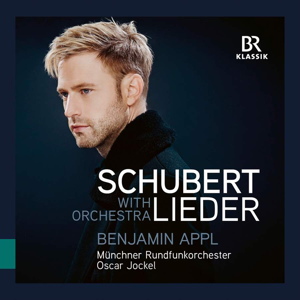
Franz Schubert (1797-1828)
Lieder with Orchestra
Benjamin Appl (baritone), Münchner Rundfunkorchester/Oscar Jockel
rec. 2022, München, BR, Studio 1, Germany
Sung texts not enclosed
Reviewed as download from press preview
BR Klassik 900346 [73]
In the foreword to this collection of Schubert songs, Benjamin Appl eagerly defends the tradition of arranging the composer’s piano accompaniments for orchestra, pointing out that Franz’s older brother Ferdinand was “in all likelihood the first to orchestrate a number of them.” That tradition has continued during the following centuries up to this very day. Well-known accompanist Alexander Schmalcz is probably the latest to have been commissioned by Matthias Goerne to provide him with arrangements for his recent DG-recording of Schubert songs. Harpist Kurt Gillmann represents the 20th century with his setting of Goethe’s Ganymed, as does Anton Webern – but only just, as his five orchestrations were written as part of a 1903 musicological seminar by a student just turned twenty, so they are, strictly speaking, apprentice works – but they are lovingly shaped, not least the Romanze from Rosamunde: Der Vollmond strahlt. The most frequent contributor on this disc with six items is Max Reger, and he is in several instances the most dramatic, even operatic. Gruppe aus dem Tartarus is certainly intense, and so is Der Wegweiser from Winterreise and of course Prometeus. Erlkönig is a miniature opera in itself, and this version is really chilling – but I miss the omnipresent sounds of the horse’s hoofs in the original piano accompaniment. Otherinteresting names are Offenbach, whose beautiful transcription of Ständchen is attractive, and Britten’s Die Forelle, with its light and airy accompaniment, is one of the highlights, with a cheeky clarinet in the foreground. Legendary conductor Felix Mottl, famous for his orchestrations of Wagner’s Wesendonck-Lieder, has set Der Tod und das Mädchen in dark colours, and Brahms’ transcription of Geheimes is very discreet. It is interesting to listen to all these skilled musicians’ various attempts to “improve” Schubert’s original thoughts – and assuredly I liked most of what I heard – but I must admit that after a while I focused more on the singing, and Benjamin Appl here proves that he is one of the foremost lieder singers now before the public.
He shows his mettle from the very beginning with his beautiful singing of Abendstern, and then song after song unfolds with unerring expertise. His lovely legato in Du bist die Ruh, his sensibly executed Tränenregen made me hope for a complete Die schöne Müllerin – Winterreise is already on the market. His elegant, almost cheerful Die Forelle, the dramatic intensity of Gruppe aus dem Tartarus, the wonderfully touching Im Abendrot, the lovely Nacht und Träume, and the soft and inward Litanei are other highlights. The grand finale is Erlkönig, where Appl differentiates sensitively between the four characters in the manner of his teacher Dietrich Fischer-Dieskau.
As a bonus, we get two handfuls of German dances in orchestral arrangements by Johann von Herbeck, spread out between the songs. They are brief, melodious and charming. The Münchner Rundfunkorchester plays both the songs and the dances excellently under the young conductor Oscar Jockel, and the recording cannot be faulted. Readers interested in the idea of hearing Schubert’s songs with orchestral accompaniments can safely invest in this issue – and be sure that the singing of Benjamin Appl is first class. Personally I’m certain that I will return to this recording once in a while for the charm of novelty – but generally I will stick to Schubert’s original.
Göran Forsling
Help us financially by purchasing from



Contents
01 Abendstern, D 806 (1824) 2:41
Text: Johann Baptist Mayrhofer ∙ Orch. Alexander Schmalcz
02 Romanze aus „Rosamunde“, D 797 (1823) 3:02
Text: Helmina von Chézy ∙ Orch. Anton Webern
03 Einleitung (Moderato poco moto) – Tanz I – Tanz II 3:23
aus „Deutsche Tänze“ (Serie 1)
Orch. Johann von Herbeck
04 Geheimes, D 719 (1821) 1:36
Text: Johann Wolfgang von Goethe ∙ Orch. Johannes Brahms
05 Du bist die Ruh, D 776 (1823) 4:18
Text: Friedrich Rückert ∙ Orch. Anton Webern
06 Tränenregen aus „Die schöne Müllerin“, D 795 (1823) 4:40
Text: Wilhelm Müller ∙ Orch. Anton Webern
07 Tanz III – Tanz IV – Tanz V aus „Deutsche Tänze“ (Serie 1) 2:28
Orch. Johann von Herbeck
08 Ganymed, D 544 (1817) 4:22
Text: Johann Wolfgang von Goethe ∙ Orch. Kurt Gillmann
09 Der Tod und das Mädchen, D 531 (1817) 2:10
Text: Matthias Claudius ∙ Orch. Felix Mottl
10 Gruppe aus dem Tartarus, D 583 (1817) 3:02
Text: Friedrich Schiller ∙ Orch. Max Reger
11 Ihr Bild aus „Schwanengesang“, D 957 (1828) 2:46
Text: Heinrich Heine ∙ Orch. Anton Webern
12 Die Forelle, D 550 (1817) 1:51
Text: Christian Friedrich Daniel Schubart
Orch. Benjamin Britten
13 Tanz VI – Tanz VII – Tanz VIII aus „Deutsche Tänze“ (Serie 1) 3:31
Orch. Johann von Herbeck
14 Im Abendrot, D 799 (1825) 3:26
Text: Karl Gottlieb Lappe ∙ Orch. Max Reger
15 An die Musik, D 547 (1817) 2:32
Text: Franz von Schober ∙ Orch. Max Reger
16 An Sylvia, D 891 (1826) 2:22
Text: William Shakespeare / Eduard von Bauernfeld
Orch. Alexander Schmalcz
17 Der Wegweiser aus „Winterreise“, D 911 (1827) 3:20
Text: Wilhelm Müller ∙ Orch. Anton Webern
18 Nacht und Träume, D 827 (1825) 3:44
Text: Matthäus von Collin ∙ Orch. Max Reger
19 Ständchen aus „Schwanengesang“, D 957 (1828) 3:33
Text: Ludwig Rellstab ∙ Orch. Jacques Offenbach
20 Tanz IX – Tanz X aus „Deutsche Tänze“ (Serie 1) 2:10
Orch. Johann von Herbeck
21 Prometheus, D 674 (1819) 5:32
Text: Johann Wolfgang von Goethe ∙ Orch. Max Reger
22 Litanei auf das Fest Allerseelen, D 343 (1816) 3:26
Text: Johann Georg Jacobi ∙ Orch. Max Reger
23 Erlkönig, D 328 (1815) 3:59
Text: Johann Wolfgang von Goethe ∙ Orch. Max Reger


















